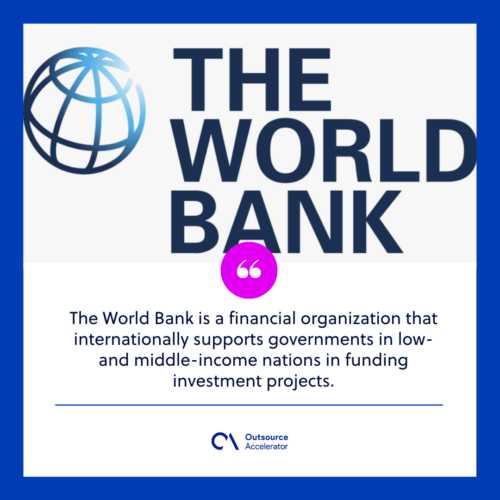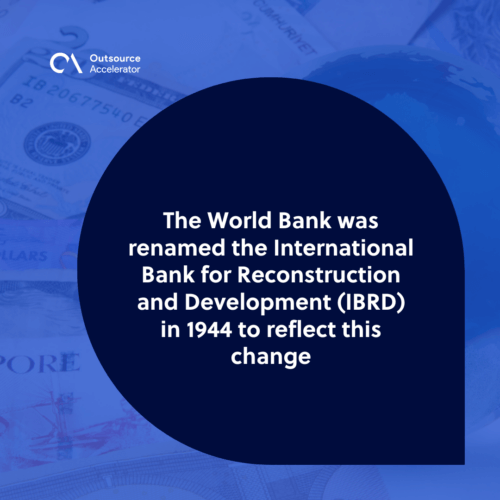World Bank
Definition
What is the world bank?
The World Bank is a financial organization that internationally supports governments in low- and middle-income nations in funding investment projects. The bank’s primary role is to aid developing countries, particularly those in the middle and lower-income brackets.
The World Bank is composed of two major institutions:
International Bank for Reconstruction and Development (IBRD)
In 1944, the first institution was founded, which was named The International Bank for Reconstruction and Development (IBRD). It is composed of a 189-member worldwide development cooperative.
Its goal is to promote sustainable development to alleviate poverty in middle-income and creditworthy impoverished countries.
IBRD serves the World Bank Group’s purpose by providing financing, assurances, risk assessment instruments, and consulting services. IBRD is also coordinating solutions to regional and global issues as the world’s largest development bank.
International Development Association (IDA)
A division of the World Bank is the International Development Association (IDA), which aids the world’s poorest countries. IDA is one of the world’s most important sources of support for the world’s 74 developing countries.
In 1960, IDA aimed to reduce poverty through the provision of credits or loans. They also provide funding for initiatives that encourage investment, reduce inequalities, and increase community situations.

What is the role of the world bank?
The World Bank Group addresses every central area of development. They offer various financial assistance and technical aid and assist countries in sharing and implementing innovative information and solutions to their problems.
They also attract investment from abroad and get a large export share.
The World Bank and the IBRD have a role to play in investing and providing them with the best world expertise to meet challenges and expand.
History of world bank
The World Bank was renamed the International Bank for Reconstruction and Development (IBRD) in 1944 to reflect this change. Initially, its loans aided in the reconstruction of countries that World War II had destroyed.
The International Finance Corporation (IFC) was established in 1956 to lend to private firms and financial institutions in developing countries.
In 1960, the International Development Association was established. It emphasized the most impoverished countries as part of a gradual move toward poverty eradication, becoming the Bank Group’s principal mission.
The World Bank has participated in various projects over the past few decades that focus on social advancement and participation, private sector development, improved healthcare, and access to education. The number of out-of-school children and youth decreased from 196 million to 124 million, primarily because of their efforts.
The Bank Group’s work now spans practically every sector critical to combating poverty, promoting economic growth, and ensuring long-term improvements in people’s lives in developing nations.
Today, the World Bank has evolved into the World Bank Group, which includes five cooperative organizations.

Complete list of countries in world bank
The governments of member countries own the institutions that make up the World Bank Group. These countries have the final say within the organizations on all topics, including policy, financial, and membership concerns.
| Afghanistan Albania Algeria Angola Antigua and Barbuda Argentina Armenia Australia Austria | Azerbaijan The Bahamas Bahrain Bangladesh Barbados Belarus Belgium Belize Benin | Bhutan Bolivia Bosnia and Herzegovina Botswana Brazil Brunei Bulgaria Burkina Faso Burundi |
| Cambodia Cameroon Canada Cape Verde The central African Republic Chad Chile Colombia Comoros D.R. Congo Congo Costa Rica Côte d’Ivoire Croatia Cyprus Czech Republic Denmark Djibouti Dominica Dominican Republic East Timor Ecuador Egypt El Salvador Equatorial Guinea Eritrea Estonia Ethiopia Fiji Finland France Gabon The Gambia Georgia Germany Ghana Greece Grenada Guatemala Guinea Guinea-Bissau Guyana Haiti | Honduras Hungary Iceland India Indonesia Iran Iraq Ireland Israel Italy Jamaica Japan Jordan Kazakhstan Kenya Kiribati Kosovo Kuwait Kyrgyzstan Laos Latvia Lebanon Lesotho Liberia Libya Lithuania Luxembourg Madagascar Malawi Malaysia Maldives Mali Malta Marshall Islands Mauritania Mauritius Mexico Micronesia Moldova Mongolia Montenegro Morocco Mozambique Myanmar | Namibia Nauru Nepal Netherlands New Zealand Nicaragua Niger Nigeria North Macedonia Norway Oman Pakistan Palau Panama Papua New Guinea Paraguay P.R. China Peru Philippines Poland Portugal Qatar Romania Russia Rwanda Saint Kitts and Nevis Saint Lucia Saint Vincent Samoa San Marino São Tomé and Príncipe Saudi Arabia Senegal Serbia Seychelles Sierra Leone Singapore Slovakia Slovenia Solomon Islands Somalia South Africa South Korea South Sudan |
| Spain Sri Lanka Sudan Suriname Swaziland Sweden Switzerland Syria Tajikistan Tanzania Thailand | Togo Tonga Trinidad and Tobago Tunisia Turkey Turkmenistan Tuvalu Uganda Ukraine United Arab Emirates United Kingdom | United States Uruguay Uzbekistan Vanuatu Venezuela Vietnam Yemen Zambia Zimbabwe |







 Independent
Independent




